介词讲义整理
- 格式:doc
- 大小:43.74 KB
- 文档页数:6

,介词的分类1. 简单介词,是指单个的介词女口:in, on, at, on, to, with 等2. 合成介词,是指两个简单介词合在一起构成的介词如:in to, on to, without, i nside3. 短语介词,是指一个或两个简单介词与一个或几个其他词类的词组合,在意义和作用上相当于一个简单介词的短语如:in stead of 代替because of 因为accord ing to 按照二,表示时间的介词in front of在…的前面1. at表示具体的时间点女口:at eight o'clock联想:at构成的固定短语:at first 首先at least 至少at prese nt 目前at noon在中午at the age of在…岁时at the same time同时at the end of在。
末at the mome nt在目前,现在at school在上学女口: _________________________________________________ In some wester n coun tries shops are closed _____________________________ w eeke nds.2. in用于年,月,季节,上午,下午,晚上等。
in March在三月in spri ng在春天in 2008 在2008 年in the morni ng/afterno on /eve ning注意:in表示在某一季节或某一月份时,一般不加冠词,但季节和月份的意义一旦具体化,就要加定冠词the。
女口:The weather is a little in May.An earthquake happe ned in Sichua n in the May of 2008.In summer childre n are happy because they can swim.联想:in构成的固定短语:show great interest in 对。
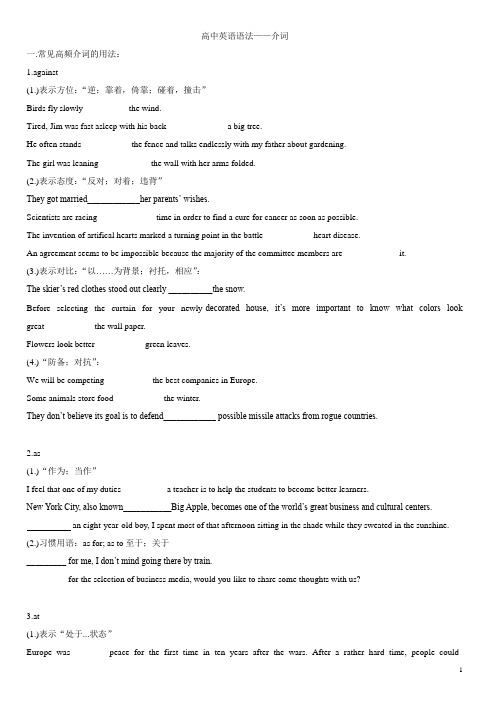
高中英语语法——介词一.常见高频介词的用法:1.against(1.)表示方位:“逆;靠着,倚靠;碰着,撞击”Birds fly slowly__________ the wind.Tired, Jim was fast asleep with his back _____________ a big tree.He often stands___________ the fence and talks endlessly with my father about gardening.The girl was leaning ___________ the wall with her arms folded.(2.)表示态度:“反对;对着;违背”They got married____________her parents’ wishes.Scientists are racing_____________ time in order to find a cure for cancer as soon as possible.The invention of artifical hearts marked a turning point in the battle___________ heart disease.An agreement seems to be impossible because the majority of the committee members are ____________ it.(3.)表示对比:“以……为背景;衬托,相应”:The skier’s red clothes stood out clearly __________the snow.Before selecting the curtain for your newly-decorated house, it’s more important to know what colors look great___________ the wall paper.Flowers look better___________ green leaves.(4.)“防备;对抗”:We will be competing __________ the best companies in Europe.Some animals store food___________ the winter.They don’t believe its goal is to defend____________ possible missile attacks from rogue countries.2.as(1.)“作为;当作”I feel that one of my duties__________ a teacher is to help the students to become better learners.New York City, also known___________Big Apple, becomes one of the world’s great business and cultural centers.__________ an eight-year-old boy, I spent most of that afternoon sitting in the shade while they sweated in the sunshine. (2.)习惯用语:as for; as to至于;关于_________ for me, I don’t mind going there by train._________ for the selection of business media, would you like to share some thoughts with us?3.at(1.)表示“处于...状态”Europe was_________peace for the first time in ten years after the wars. After a rather hard time, people couldlive________ at last. (注意:in peace“平静地、安静地”=peacefully; at peace处于和平状态)The two countries are _________ war.(2.)表示“在...时刻、钟点、岁”Children begin schooling___________ the age of five.The two brothers decided to leave _________ midnight, for they had many miles to cover.The advertisement said that a suitable house in a quiet area was up for sale___________ a reasonable price(3.)表示速度、价格、比率:“以...”The population of the world is growing_________ a surprising rate.Gary must have driven_________ the speed of 80 miles an hour just now, for which he was given a ticket by a policeman.(4.)表示目标、方向:“对、向、朝”,这类动词有:laugh, come, aim, pointHe aimed_______ the target.I stared __________everything as if I were looking for the first time.My uncles immediately jumped up and shot their arrows ________ the bird.(5.)表示“应...请求、号召、邀请”We came to Beijing_________ the invitation of my good friend who has been woeking here for three years.(6.)习惯用语:“at+名词短语”:表示“一...就...”at the sight of...一看见...就... at the sound of...一听到...就... at the thought/ ideaof...一想起...就... at the news of ...一得到...的消息,就...The girl cried _________ the sight of her mother.The terrible king’s wish was that all the people would shake in fear_________ the sound of his order.People in love with each other may feel empty and sick___________ the thought of not being together.4.beyond(1.)表示程度:“超出,非……所能及”To be acknowledged as the first to receive this honor is_____________ expression in words for me.You really nee d to pay a visit to Shanghai since you haven’t been there for years, and you will find changes there are_____________ imagination.We must read not only between the lines, but sometimes__________ the lines so that we can fully understand the writer. (2.)表示时间:“过了,比...晚,迟于……”He delayed the matter ________ the fixed time.He came home__________ the usual time.(3.)表示位置:“在……另一边,在……更远处”The woods go for about two miles ___________ the river. 这片森林伸展到河那边大约两英里。
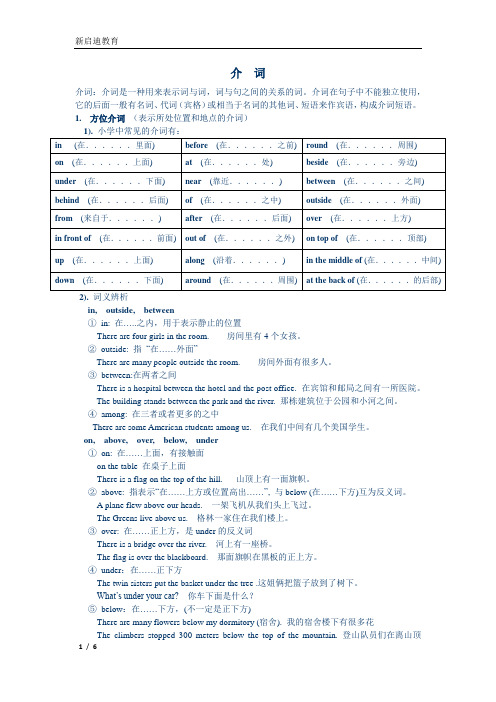
介词介词:介词是一种用来表示词与词,词与句之间的关系的词。
介词在句子中不能独立使用,它的后面一般有名词、代词(宾格)或相当于名词的其他词、短语来作宾语,构成介词短语。
1.方位介词(表示所处位置和地点的介词)2). 词义辨析in, outside, between①in: 在…..之内,用于表示静止的位置There are four girls in the room. 房间里有4个女孩。
②outside: 指“在……外面”There are many people outside the room. 房间外面有很多人。
③between:在两者之间There is a hospital between the hotel and the post office. 在宾馆和邮局之间有一所医院。
The building stands between the park and the river. 那栋建筑位于公园和小河之间。
④among: 在三者或者更多的之中There are some American students among us. 在我们中间有几个美国学生。
on, above, over, below, under①on: 在……上面,有接触面on the table 在桌子上面There is a flag on the top of the hill. 山顶上有一面旗帜。
②above: 指表示“在……上方或位置高出……”, 与below (在……下方)互为反义词。
A plane flew above our heads. 一架飞机从我们头上飞过。
The Greens live above us. 格林一家住在我们楼上。
③over: 在……正上方,是under的反义词There is a bridge over the river. 河上有一座桥。
The flag is over the blackboard. 那面旗帜在黑板的正上方。

初中英语专题复习——介词一、介词概念介词是一种虚词,它在句中的作用非常重要。
它用来表明名词与句中其他词的关系,但是介词不能单独使用。
常考点包括一些固定搭配和一些近义词。
固定搭配如:on one's way home,help…with,send for,be interested in…,be late for,be angry with,be good at等。
for表示多长时间。
since后接时间起点,其终点往往为现在,常与:这两个介词都可以表示时间"在以后"的意思。
其区别是:after 以;in 以现在为起点,表示将来一段时间以后,常用于将来时态的句子。
by表示"以…的方式,方法,手段" 和"乘某种交通工具";with";in 表示"以……方式,用语言,文字等媒介"。
It's impossible for me to watch TV after eleven o'clock.It's kind of you to help me.之前的形容词用于描写事物的特点,如可能性,必然性,难易程度等。
二、介词具体点拨(一) 知识概要介词在英语中用法很活,也无一定规律可循。
在初中范围内应学一个记住一个,特别是那些和动词的特殊搭配。
下面是一般的规律,可帮助学习时参考介词表示时间,表示地点,方位,表示原因方式,其他。
①about 大约在……时间 如:about five o'clock 在周围②about 大约多远如:about five kilometers③about 关于、涉及如:talk about you④above 高出某一平面如:above sea level如:walk across the street在……之后 如:after supper……后面如:one after another ③追赶如:run after you背靠,逆风如:against the wall,against the windbe against you如:among the trees在某时刻 如:at ten ②在小地点如:at the school gate如:at high speed ④向着,对着如:at me①在……之前 如:before lunch……之前 如:sit before me①位于……之后 如:behind the tree①低于……水平 如:below zero如:below the standard①到……时刻,在……时刻之前如:by five o'clock紧挨着如:site by site③乘坐交通工具如: by air在……期间如:during the holidays①延续多长时间 如:for five years……去如:leave for Shanghai③为了,对于如:be good for you①从某时到……某时 如:from morning till night如:from New York③由某原料制成如:be made from⑤来自何处 如:where are you from①在年、月、周较长时间内 如:in a week②在里面如:in the room用某种语言 如:in English ④穿着如:in red①进入……里面如:walk into②除,分 如:divide into ③变动 如:turn into water①接近某时 如:near five years ②在……附近 如:near the park①用某种原料制成 如:be made of②属于……性质 如:a map of U. S .A①某日、某日的上下午如:on Sunday afternoon②在……上面 如:on the desk ③靠吃……为生如:live on rice③关于 如:a book on Maths①渡过一整段时间 如:work over night②在上方如:over the desk③超过,高于 如:over five pairs①超过某一时刻 如:ten past five②经过某地 如:walk past the park①从某时以来 如:since 1980 ②原因 如:Since you were ill①经过某一时期 如:through his life②通过、穿过某地 如:through the forest①直到某时为止 如:till five o'clock①差多少时间 如:five to ten ②问,到,去往 如:to Shanghai ③面对面 如:face to face ④给予如:give a book to me①在……下面 如:under the desk ②少于 如:under ten在……管制之下如:under the rule①用某种工具 如:with a pen ②带着,具有如:with me没有 如:without air(二) 正误辨析[误]We got to the top of the mountain in daybreak.[正]We got to the top of the mountain at day break.[析]at用于具体时刻之前,[误]Don't sleep at daytime[正]Don't sleep in daytime.[析]in 要用于较长的一段时间之内,或或[正]We visited the old man on Sunday afternoon.[析]in the morning,前面的介词都要改为on,[误][正]He became a writter in his twenties[析]这句话应译为:他在20[误]He went to New York to find a job in sixteen years old.[正]He went to New York to find a job at sixteen.[析]在具体年岁前用at,等等。
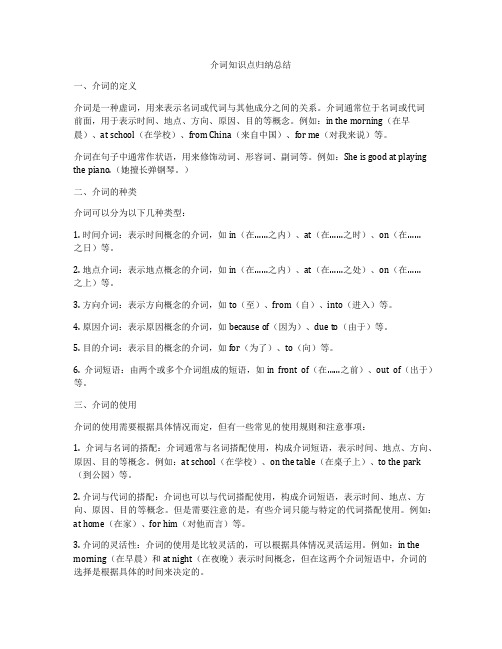
介词知识点归纳总结一、介词的定义介词是一种虚词,用来表示名词或代词与其他成分之间的关系。
介词通常位于名词或代词前面,用于表示时间、地点、方向、原因、目的等概念。
例如:in the morning(在早晨)、at school(在学校)、from China(来自中国)、for me(对我来说)等。
介词在句子中通常作状语,用来修饰动词、形容词、副词等。
例如:She is good at playing the piano.(她擅长弹钢琴。
)二、介词的种类介词可以分为以下几种类型:1. 时间介词:表示时间概念的介词,如in(在……之内)、at(在……之时)、on(在……之日)等。
2. 地点介词:表示地点概念的介词,如in(在……之内)、at(在……之处)、on(在……之上)等。
3. 方向介词:表示方向概念的介词,如to(至)、from(自)、into(进入)等。
4. 原因介词:表示原因概念的介词,如because of(因为)、due to(由于)等。
5. 目的介词:表示目的概念的介词,如for(为了)、to(向)等。
6. 介词短语:由两个或多个介词组成的短语,如in front of(在……之前)、out of(出于)等。
三、介词的使用介词的使用需要根据具体情况而定,但有一些常见的使用规则和注意事项:1. 介词与名词的搭配:介词通常与名词搭配使用,构成介词短语,表示时间、地点、方向、原因、目的等概念。
例如:at school(在学校)、on the table(在桌子上)、to the park (到公园)等。
2. 介词与代词的搭配:介词也可以与代词搭配使用,构成介词短语,表示时间、地点、方向、原因、目的等概念。
但是需要注意的是,有些介词只能与特定的代词搭配使用。
例如:at home(在家)、for him(对他而言)等。
3. 介词的灵活性:介词的使用是比较灵活的,可以根据具体情况灵活运用。
例如:in the morning(在早晨)和at night(在夜晚)表示时间概念,但在这两个介词短语中,介词的选择是根据具体的时间来决定的。
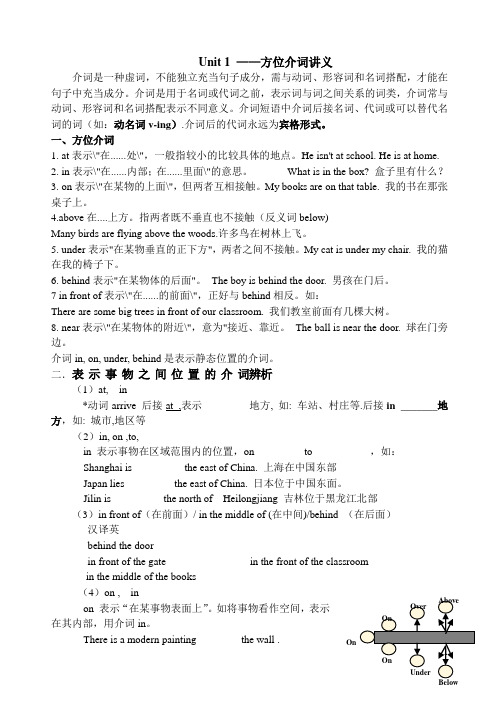
Unit 1 ——方位介词讲义介词是一种虚词,不能独立充当句子成分,需与动词、形容词和名词搭配,才能在句子中充当成分。
介词是用于名词或代词之前,表示词与词之间关系的词类,介词常与动词、形容词和名词搭配表示不同意义。
介词短语中介词后接名词、代词或可以替代名词的词(如:动名词v-ing).介词后的代词永远为宾格形式。
一、方位介词1. at表示\"在......处\",一般指较小的比较具体的地点。
He isn't at school. He is at home.2. in表示\"在......内部;在......里面\"的意思。
What is in the box? 盒子里有什么?3. on表示\"在某物的上面\",但两者互相接触。
My books are on that table. 我的书在那张桌子上。
4.above在....上方。
指两者既不垂直也不接触(反义词below)Many birds are flying above the woods.许多鸟在树林上飞。
5. under表示"在某物垂直的正下方",两者之间不接触。
My cat is under my chair. 我的猫在我的椅子下。
6. behind表示"在某物体的后面"。
The boy is behind the door. 男孩在门后。
7 in front of表示\"在......的前面\",正好与behind相反。
如:There are some big trees in front of our classroom. 我们教室前面有几棵大树。
8. near表示\"在某物体的附近\",意为"接近、靠近。
The ball is near the door. 球在门旁边。
介词in, on, under, behind是表示静态位置的介词。

介词一、介词的分类:时间介词地点介词方式介词二、知识点精讲:1.表示地点位置的介词1)at ,in, on, to:in表“范围较大的地方”,强调“空间”;at表在“范围较小的地方”,强调“点”;on 表“在物体的表面”in:(1)表示在大地方; He arrives ____ Nanjing . (2)表示“在…范围之内” He lives____ the bedroomat: (1)表示在小地方; He arrives ____ home (2)表示“在……附近,旁边” He sat ____the table表示方位:in:表“在…范围之内” on: 表毗邻,接壤,。
t o: 表示在……范围外,不强调是否接壤;或“到……”Hunan lies ___the south of Hubei. Taiwan lies ___the east of China. China lies _____the west of America.表位置:in “在……内”,on “在……上”(接触表面),on “在两边”“在左/右边”。
They are putting up a picture_________thewall.The girl ______the right is a famous actress.1)____ the tree 用于指树上的鸟、人等。
___ the tree用于指生长在树上果实。
2)____ the wall镶嵌在墙内,窗户、门等。
____ the wall在墙的表面之上,地图等。
在报纸上____ the newspaper报上的内容。
____ the newspaper放在报纸上的东西3).There is a big hole ____ the wall. 4).The teacher put up a picture ____ the wall.2)by, beside, near和next to/close to1) by和beside均表示“在……旁边”,常可换用There is a chair ____ the table. 桌子边上有一把椅子。

介词知识点的归纳总结一、介词的定义介词是一种虚词,用来连接名词、代词、动名词或者其他成分,构成介词短语,表示时间、地点、方向、方式等关系。
二、介词的分类1. 根据功能(1)时间介词:on, at, in, before, after, during等(2)地点介词:in, on, at, under, above, below等(3)方向介词:to, from, into, out of, along, toward等(4)方式介词:by, with, through, for, like等2. 根据用法(1)简单介词:单个词组成的介词,如in, on, at等(2)复合介词:由两个或两个以上的词组成的介词,如because of, in spite of, on behalfof等3. 根据构词(1)合成介词:由两个或两个以上词组成的介词,如into, toward等(2)派生介词:通过增加后缀或叠加形成的介词,如underneath, throughout等三、介词短语的作用介词短语通常用来修饰名词或者代词,起着修饰、定位、时间、地点、方式等作用。
介词短语在句子中担任着重要的语法成分,需要注意其搭配和使用。
1. 修饰名词或代词介词短语可以修饰名词或代词,起着定语的作用。
如:the book on the table(桌子上的书)2. 表示时间介词短语可以表示时间的起止、时点、持续等概念。
如:at six o'clock(在六点)3. 表示地点介词短语可以表示地点的位置、方向、边界等概念。
如:in the box(在盒子里)4. 表示方式介词短语可以表示动作的方式、手段、原因等。
如:by train(乘火车)四、介词的用法注意事项1. 介词的搭配介词的搭配非常重要,不同的介词搭配可以表达不同的意义。
比如:at school, in the school, on the school都表示不同的含义。
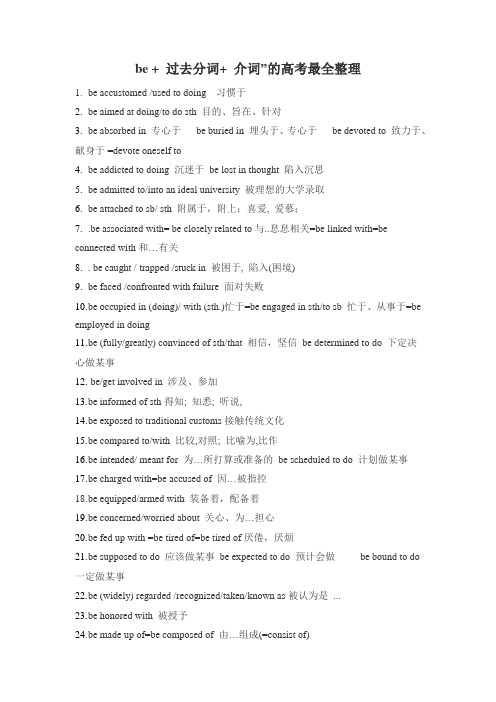
be + 过去分词+ 介词”的高考最全整理1.be accustomed /used to doing 习惯于2.be aimed at doing/to do sth 目的、旨在、针对3.be absorbed in 专心于 be buried in 埋头于、专心于 be devoted to 致力于、献身于 =devote oneself to4.be addicted to doing 沉迷于be lost in thought 陷入沉思5.be admitted to/into an ideal university 被理想的大学录取6.be attached to sb/ sth 附属于,附上;喜爱, 爱慕;7..be associated with= be closely related to与..息息相关=be linked with=be connected with和…有关8.. be caught / trapped /stuck in 被困于, 陷入(困境)9.be faced /confronted with failure 面对失败10.b e occupied in (doing)/ with (sth.)忙于=be engaged in sth/to sb 忙于、从事于=be employed in doing11.b e (fully/greatly) convinced of sth/that 相信,坚信be determined to do 下定决心做某事12.be/get involved in 涉及、参加13.b e informed of sth得知; 知悉; 听说,14.b e exposed to traditional customs接触传统文化15.b e compared to/with比较,对照; 比喻为,比作16.b e intended/ meant for 为…所打算或准备的be scheduled to do 计划做某事17.b e charged with=be accused of 因…被指控18.b e equipped/armed with 装备着,配备着19.b e concerned/worried about 关心、为…担心20.b e fed up with =be tired of=be tired of厌倦,厌烦21.b e supposed to do 应该做某事be expected to do 预计会做be bound to do 一定做某事22.b e (widely) regarded /recognized/taken/known as被认为是...23.b e honored with 被授予24.b e made up of=be composed of 由…组成(=consist of)25.b e surprised /astonished/amazed/shocked at 对…惊讶的26.b e dressed in 穿戴着27.b e covered with 覆盖着be filled with 充满be seated 就座28.b e surrounded by 被...包围29.b e based on 在...基础上30.b e set in 以...为背景31.b e crowded with 挤满32.b e burdened/loaded with 负担着...33.b e combined with 与...相结合34.b e accompanied by 伴有...35.b e located in/on 坐落于36.b e regarded/recognized/taken as 被视为、37.b e known as/for 作为/因为...而出名。

介词一、概念:介词是一种用来表示词与词,词与句之间的关系的词。
在句中不能单独作句子成分。
介词后面一般有名词代词或相当于名词的其他词类,短语或从句作它的宾语。
介词和它的宾语构成介词词组,在句中作状语,表语,补语或介词宾语。
并且在定语从句"介词+whom/which"的结构中,不能用that代替whom/which。
She is a good student from whom we should learn.介词分为:时间介词、地点位置方向介词、方式介词、原因介词和其他介词。
二、相关知识点精讲介词口诀:自从以当为按照,由于对于为了到;和跟把比在关于,除了同对向往朝;用在名词代词前,修饰动形要记牢。
1、表示地点位置的介词1)at,in,on,to,forat-表示在小地方;表示"在…附近,旁边"in-表示在大地方;表示"在…范围之内"。
on-表示毗邻,接壤,"在…上面"。
to-表示在…范围外,不强调是否接壤;或"到…"。
2)above,over,on 在…上above-指在…上方,不强调是否垂直,与below相对;The bird is flying above my head.over-指垂直的上方,与under相对,但over与物体有一定的空间,不直接接触。
There is a bridge over the river.on-表示某物体上面并与之接触。
He put his watch on the desk.3)below,under 在…下面under-表示在…正下方There is a cat under the table.below-表示在…下,不一定在正下方Please write your name below the line.4)in front of,in the front of在…前面in front of…-意思是"在…前面",指甲物在乙物之前,两者互不包括;其反义词是behind(在…的后面)。
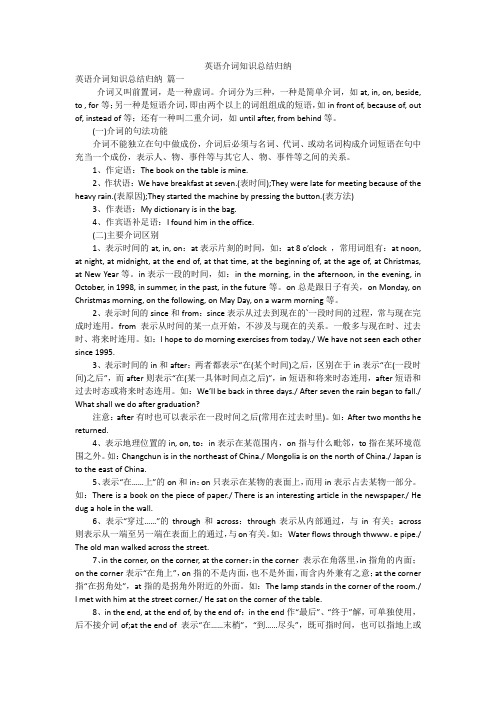
英语介词知识总结归纳英语介词知识总结归纳篇一介词又叫前置词,是一种虚词。
介词分为三种,一种是简单介词,如at, in, on, beside, to , for等;另一种是短语介词,即由两个以上的词组组成的短语,如in front of, because of, out of, instead of等;还有一种叫二重介词,如until after, from behind等。
(一)介词的句法功能介词不能独立在句中做成份,介词后必须与名词、代词、或动名词构成介词短语在句中充当一个成份,表示人、物、事件等与其它人、物、事件等之间的关系。
1、作定语:The book on the table is mine.2、作状语:We have breakfast at seven.(表时间);They were late for meeting because of the heavy rain.(表原因);They started the machine by pressing the button.(表方法)3、作表语:My dictionary is in the bag.4、作宾语补足语:I found him in the office.(二)主要介词区别1、表示时间的at, in, on:at表示片刻的时间,如:at 8 o’clock ,常用词组有:at noon, at night, at midnight, at the end of, at that time, at the beginning of, at the age of, at Christmas, at New Year等。
in表示一段的时间,如:in the morning, in the afternoon, in the evening, in October, in 1998, in summer, in the past, in the future等。

介词一;介词的分类1.简单介词;是指单个的介词如: in; on; at; on; to; with等2.合成介词;是指两个简单介词合在一起构成的介词如: into; onto; without; inside3.短语介词;是指一个或两个简单介词与一个或几个其他词类的词组合;在意义和作用上相当于一个简单介词的短语如: instead of 代替 because of因为according to按照 in front of 在...的前面二;表示时间的介词1.at表示具体的时间点如:at eight o’clock联想: at构成的固定短语:at first首先 at least至少at present目前 at noon在中午at the age of在...岁时 at the moment在目前;现在at the same time同时 at school 在上学at the end of在......末如: In some western countries shops are closed___________ weekends.2.in用于年;月;季节;上午;下午;晚上等..in March在三月 in spring在春天in 2008在2008年 in the morning/afternoon/evening注意: in表示在某一季节或某一月份时;一般不加冠词;但季节和月份的意义一旦具体化;就要加定冠词the..如: The weather is a little in May.An earthquake happened in Sichuan in the May of 2008.In summer children are happy because they can swim.联想:in构成的固定短语:hand in上交 in fact事实上in surprise吃惊地 in search of寻找in public当众 in the end最后;终于in no time立刻;马上 in a minute立刻;马上in front of在...前面 in a word一句话;总而言之in good health身体健康的 do well in在...方面干的不错be interested in对...感兴趣 in common共同的show great interest in对......感兴趣in the last/past several years在过去的几年里3.表示具体的某一天或某一天的早晨;晚上等;用on..如: In the morning I often get up at six o’clock but________Sunday morning; I get up at seven.A traffic accident happened near our school _________ the night of May 2nd; 2014.联想:on构成的固定短语:on board乘坐车;飞机 on duty值班;值日on earth到底 on fire着火on foot 步行 on hire雇佣on holiday度假 on time按时be on show展览 on the right在右边on the other hand另一方面 a book on history一本关于历史的书on one’s way to在某人去...的路上4.表示时间的since; for; by; during; until1since自从后跟具体的过去时间;for后接一段时间..for和since短语所在的句子应用现在完成时;谓语动词要用延续性动词..如:Great changes have taken place in my hometown since the year 2000.We have lived in the city for about five years.(2)by+时间点;意为“到...为止”;如果by后面跟的是将来的时间点;用一般将来时或将来完成时;如果by后面跟一个过去的时间点;用过去完成时..如: I will finish eating by nine o’clock.By the end of last week; we had finished learning Unit5.(3)during+时间段;与延续性动词连用;表示某期间的动作..如:She had trained hard during the four years to get ready for London Olympic Games.(4)until+时间点;意为“道...为止”;句中的谓语动词若是非延续性动词;构成句型not...until直到...才如: We stayed there until the sunset.We didn’t go home until the sunset.(5)表示时间前后的before; afterbefore在...之前; after在...之后如:We must hand in our homework before class.After half past eleven we can relax ourselves.注意:before作为介词;还可以表示“面临;面对”如:What should you do before so many difficultiesI had nothing to say before her.三.表示方位;地点;行为对象等的介词1.表示方位的介词in; to; onin表示包含关系;意为“在......范围内”;on表示相邻关系;接壤;to表示相隔关系..如:China is________ the east of Asia.Japan is ________ the east of China.Russia is ________ the north of China.2.表示“上下”等方位的介词over; under; above; below; on(1)over在......正上方;其反义词为under如:There is a football under the desk.I looked up and saw a plane flying over my head.(2)above表示“在......上方”;非垂直关系; 其反义词为below如:The plane is flying above the clouds.(3)on在......之上;指两者表面接触..其反义词也为under3.表示“前后”的介词和短语介词(1)in front of 在......前面;指在范围之外的前面;和before意义接近..如:There are some bikes in front of the teaching building.(2)behind是in front of 的反义词;意为“在......后面”(3)in the front of表示在范围之内的前面;其反义词组是at the back of4.by; beside在......旁边;between在两者之间; among在三者及以上之间(1)by和beside意义相近如:Do you know the man who is standing by the windowLucy sits beside me. She is my deskmate.(2)between指两者之间;也表示三者或多者中的每两者之间;among指三个或三个以上的事物或人之间..注意:between表示两者之间;只要构成双方关系;就可以用between如:There are so many desks in the classroom that there is hardly any room to move between them. 教室里有这么多张课桌;几乎没有空间从它们中间穿过..5.across; through穿过across从表面穿过;through穿越;穿透;透过;指从物体内部穿过..如:1When you go________ the road; you must be careful.2Which river runs________ Shanghai3 --I left my keys in the room yesterday. I had to get in________ the window.--It’s dangerous to do that.A. inB. throughC. overD. to6.表示里外的in; inside; into; onto; out of; outside(1)in在......之内如:My keys are in my pocket.注意:外来物“在树上”;用in;树上结出的东西“在树上”;用on如:There are some birds________ the tree.Autumn comes and some red apples________ the apple trees come into people’s eyes.(2)inside在......里面;到......里面..反义词为outside如:ListenSomeone is talking in a low voice inside the door.Don’t stay outside.(3)into到......内..强调空间或状态的转换..反义词为out of如: Why not go into the house and have a lookHe looked out of the window and saw some people coming back from work.注意: out of 还有“脱离;失去”等意义..如: He has been out of work for long.Fish can’t live long out of water.7.表示“靠近”的near; next to; aroundnear在......附近next to在......旁边around在......周围如: There is a park near our neighborhood.I didn’t remember to phone until near the end of the week.The mouse is next to my computer.That patient is next to death.The flowers and applause掌声 are always around the winners.注意:around 还表示“大约”;同义词:about如:It was around/about twelve o’clock in the evening.8.表示运动方向的for; to; towards(1)for常接在leave; start等动词之后;表示运动的方向或目的地..如: They’ll leave for Beijing to attend the meeting next month. (2)to跟在go; come; return; move等动词之后;表示目的地;它既表示运动方向;又包含运动结果..如:When did you return to Guangzhou after the summer holiday(3)towards朝;向..只说明运动的方向;没有“到达”的意思如: The teacher is coming towards the classroom now.9.表示行为对象的to; at一般来说;at 同某些动词连用;表示攻击目标;含有某种程度的恶意;to则只表示方向;并无恶意..如: I threw the ball to him and he threw it at the dog.He came________me and said hello to me.A dog came________her and she was frightened受惊吓的..10.最高级结构中表示范围的of; in同类比较时;若主语和范围一致;一般用of; of后多为数词或可数名词复数;将某人/某物置于集体或环境中进行比较时;用in; in后一般是可数名词的单数..如:She is the most beautiful girl ________ the three sisters.Tom is the tallest boy________ the class.四.表示“除......之外”的介词1.besides除......之外还如: Five others were late besides me.There will be five of us for dinner; besides John.2.but; except除......之外..but常与否定词连用如: No one but we knows about the news.He has few friends except you in this school.He has few friends except you in this school.They all went to sleep except me.3.except for表示从整体中排除;除......之外;前后不是一类事物..如: The care is really wonderful except for its price.The composition is quite good except for a few spelling mistakes.五.表示方式;手段或工具的介词1.by; in; on表交通方式by bike=on a bike; by car=in a car如:Do you usually come to school by bike2.by; in with表示手段或工具(1)by表示用某种方式或手段..名此前不加冠词..如: This pair of shoes is made by hand.The old man had to make money by selling vegetables.(2)in表示使用某种语言;用墨水;颜色;颜料等..名此前不加冠词..如: Can you say it in EnglishPlease write it in ink; not in pencil.(3)with后跟具体的工具如: People here build houses with stones.I like to write with a ball pen.拓展:with常用来表示伴随;意为“有;带有”;其反义词为without如:This is a house with a garden.Fish can’t live without water.六.引出动词不定式逻辑主语的介词..1.一般情况下用for sb. to do sth如:It’s necessary for us to learn English.It’s difficult for children to read such a book.2.表示品质;性格;特征的形容词后用of sb. to do sth.; 这类句型中动词不定式的逻辑主语和形容词构成主系表结构..如:It’s foolish of him to make such a decision.It’s kind of you to give me so much help.七.其它介词的用法1.as作为;as for至于如: ________students we should work hard.He works________ a teacher in this school.________him; I know nothing.2.thanks to 同because of;意为“因为;由于”如:Thanks to your help; I am good at my lessons.Because of the weather; we have to put off the sports meet.八.介词的省略1.in的省略be busy in doing sth忙于做某事have difficulty/trouble in doing sth.做某事有困难in this/that way以这种/那种方法spend...in doing sth. 花费......做某事have a good time in doing sth. 做某事很高兴waste... in doing浪费......做某事There’s no use/good in doing sth.做某事有用/没有好处2.for的省略for+时间段里的for;在口语中可以省略;尤其是在肯定句中..但是在否定句中或在句首一般不可以省略..如:The rain lasted for a whole afternoon.He has been waiting for three hours.We haven’t seen each other for a long time.For a whole month; there is no rain.九.常用介词短语1.常与with连用的短语do with处置;对付go on with继续......agree with同意......be busy with忙于keep/catch up with跟上fill...with....用......装满......be familiar with...熟悉......be popular with...受......欢迎be angry with sb.生某人的气cover...with....用......覆盖........ help...with...在......方面帮助...... get on well with与......相处的好be strict with sb.对某人要求严格be pleased with sb.对某人感到满意2.常与at 连用的短语look at看knock at敲at last最后at once立刻laugh at嘲笑......shoot at朝......射击work at致力于......be good at擅长......be weak at不擅长......arrive at到达某地小地方be amazed at对......感到吃惊3.常与on连用的短语get on上车turn on打开try on试穿put on穿上call on 号召depend on依靠;取决于live on 依赖........生活spend...on...在......上花费......4.常与of连用的短语hear of听说take care of照料look out of朝外看a kind of一种a type of一种be fond of喜欢instead of代替......think of认为;考虑all kinds of各种各样的be proud of为......而骄傲be confident of对......有信心be tired of对......感到厌烦be made of由......制成能看出材料be scared/afraid/terrified of...害怕......5.常与from连用的短语come from来自于be far from距离......远hear from收到......的来信across from在......的对面be different from与......不同borrow... from...从......借来......be made from由......制成看不出原料6.常与for连用的短语look for寻找for example例如be late for迟到be fit for适合wait for等候pay for为......付款for a while一会儿as for至于;关于be sorry for为......感到抱歉send for派人去请......leave for离开去......ask for请求;向......要...... thanks for为......感谢......get ready for为......做好准备be famous/known for以......而闻名7.常与to连用的短语get to到达turn to翻到pay attention to注意listen to听according to根据......be next to在......隔壁be friendly to对......友好to one’s joy使某人高兴的是be polite to sb. 对某人有礼貌to one’s surprise使某人惊讶的是。

中考英语语法表示场所、方向的介词得以讲义及总结与整理①表示场所的介词:at,in,on,under,by,near,between,around,opposite等②表示方向的介词:into,out of,along,across,through,up,down,past等1.at,inA.at:在某地点(表示比较狭窄的场所)at the school gate在学校门口at 2 Baker Street在贝克街2号at home在家at the door在门边at a factory在一家工厂at the bottom of在……下面/底部at the party在聚会上at the back of在……后边at the end of在……末尾at the head of在……排头at Mike’s house在迈克家at the crossroads在十字路口at the hotel在宾馆at the bus stop在公共汽车站at the airport在机场at my desk在我的书桌旁I’ll meet him at the Beijing railway station.(我将去北京站接他。
)B.in:在某地(表示比较宽敞的场所)in Beijing在北京in the world在世界上in China在中国in the street在街上in the yard在院子里in a room在房间里in the middle在中部in the house在房子里in the air在空中in the newspaper在报纸上in the photo在照片里in the picture在图画里in a queue排队in the open air在户外Hong Kong is a very crowded city inthe south of China.(香港是中国南方一个非常拥挤的城市。

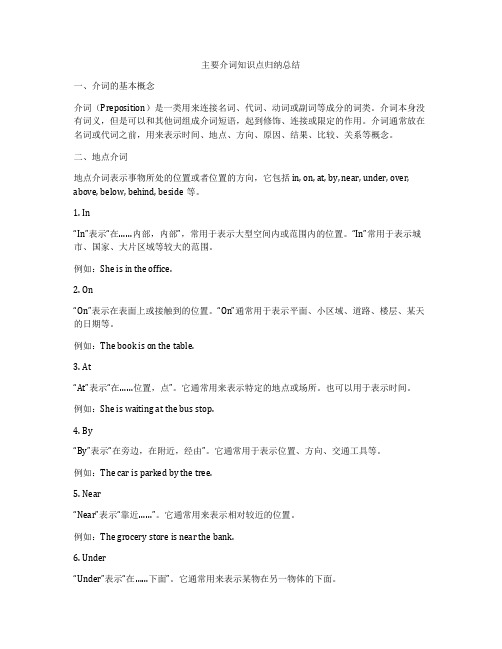
主要介词知识点归纳总结一、介词的基本概念介词(Preposition)是一类用来连接名词、代词、动词或副词等成分的词类。
介词本身没有词义,但是可以和其他词组成介词短语,起到修饰、连接或限定的作用。
介词通常放在名词或代词之前,用来表示时间、地点、方向、原因、结果、比较、关系等概念。
二、地点介词地点介词表示事物所处的位置或者位置的方向,它包括in, on, at, by, near, under, over, above, below, behind, beside等。
1. In“In”表示“在……内部,内部”,常用于表示大型空间内或范围内的位置。
“In”常用于表示城市、国家、大片区域等较大的范围。
例如:She is in the office.2. On“On”表示在表面上或接触到的位置。
“On”通常用于表示平面、小区域、道路、楼层、某天的日期等。
例如:The book is on the table.3. At“At”表示“在……位置,点”。
它通常用来表示特定的地点或场所。
也可以用于表示时间。
例如:She is waiting at the bus stop.4. By“By”表示“在旁边,在附近,经由”。
它通常用于表示位置、方向、交通工具等。
例如:The car is parked by the tree.5. Near“Near”表示“靠近……”。
它通常用来表示相对较近的位置。
例如:The grocery store is near the bank.6. Under“Under”表示“在……下面”。
它通常用来表示某物在另一物体的下面。
例如:The cat is under the bed.7. Over“Over”表示“在……之上”。
它通常用来表示某物体在另一物体的上方。
例如:The plane is flying over the city.8. Above“Above”表示在某物体的上方,意思与“over”相似,但更侧重于位置或高度关系。
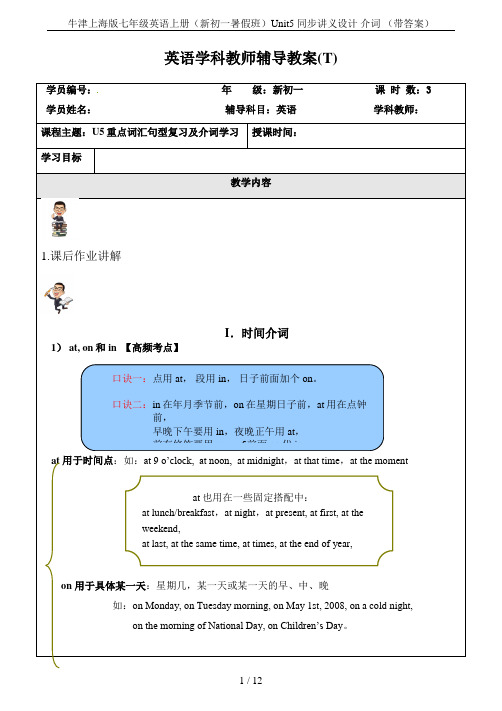
英语学科教师辅导教案(T)学员编号:年级:新初一课时数:3 学员姓名:辅导科目:英语学科教师:课程主题:U5重点词汇句型复习及介词学习授课时间:学习目标教学内容1.课后作业讲解I.时间介词1) at, on和in 【高频考点】口诀一:点用at,段用in,日子前面加个on。
口诀二:in在年月季节前,on在星期日子前,at用在点钟前,早晚下午要用in,夜晚正午用at,前有修饰要用on,of前面on代in。
at 用于时间点:如:at 9 o’clock, at noon, at midnight,at that time,at the momentat也用在一些固定搭配中:at lunch/breakfast,at night,at present, at first, at theweekend,at last, at the same time, at times, at the end of year,at this time of year,at Christmas, at New Yearon用于具体某一天:星期几,某一天或某一天的早、中、晚如:on Monday, on Tuesday morning, on May 1st, 2008, on a cold night,on the morning of National Day, on Children’s Day。
练习: They will have a maths test two daysA forB atC inD afterkey:C4)before和afterafter用法见“after和in”before + 时间点,表示“在……之前”。
Please bring your homework before ten o’clock.I will go back to see you before one o’cloc k.II.其他介词补充1)between 和amongbetween 表示两者之间或是多者中两两之间。

介词常见介词的活用(by,with,against,over,on,in,at,besides,for)1.over可表位置,意为“在……上方,越过;遮住,盖住”,也可表时间,意为“在……期间,(多年)以来”等,它还有“在……(问题)上,对(某事)”等引申意义。
如:①Y0u can’t wear a blue jacket over that shirt—it’ll look terrible.你不能在那件衬衣外面再穿上蓝色的夹克——太难看了。
②We had a pleasant chat over a cup of tea.我们一边喝茶一边愉快地交谈。
③We heard it over the radio.我们从广播中听到了它。
2.by的主要意思有“在……旁,靠近;乘(车、船等);不迟于;到……为止;被,由;根据,按照(关系);通过……方式”等,还可以用来表示增加或减少的程度。
by构成的常见短语有:by and by不久,迟早by and large大体上by oneself单独by the way顺便说说by far……得多,最…… by chance碰by accident偶然地by means of借助by no means绝不,一点也不by mistake错误地①The water in the river rose by two meters.②He is an Englishman by birth.他在血统上是英国人。
3.with可以用来表示“带有,拥有;随着;就……来说;用,以;和,与;对于,关于”等意思。
with还可用来表示原因。
如:①He turned red with anger.他气得脸变红了。
②The problem with looking into space from the earth is that there is a lot of dust in the earth’s air.从地球上观察太空存在一个问题,就是地球的大气中有大量的尘埃。
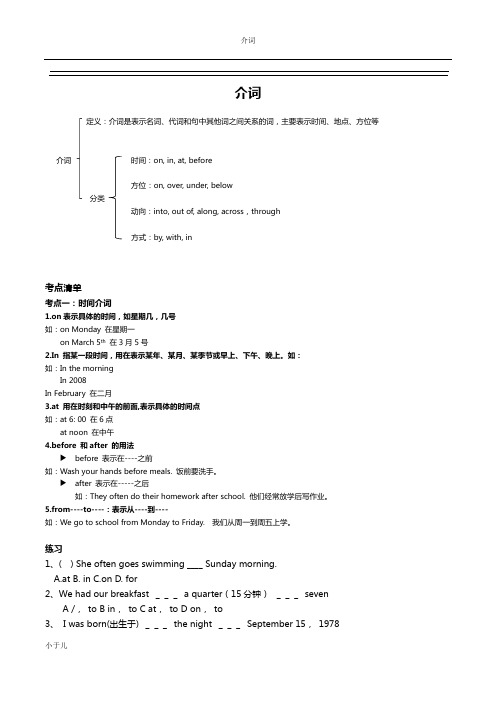
介词定义:介词是表示名词、代词和句中其他词之间关系的词,主要表示时间、地点、方位等介词时间:on, in, at, before方位:on, over, under, below分类动向:into, out of, along, across,through方式:by, with, in考点清单考点一:时间介词1.on表示具体的时间,如星期几,几号如:on Monday 在星期一on March 5th在3月5号2.In 指某一段时间,用在表示某年、某月、某季节或早上、下午、晚上。
如:如:In the morningIn 2008In February 在二月3.at 用在时刻和中午的前面,表示具体的时间点如:at 6: 00 在6点at noon 在中午4.before 和after 的用法◆before 表示在----之前如:Wash your hands before meals. 饭前要洗手。
◆after 表示在-----之后如:They often do their homework after school.他们经常放学后写作业。
5.from----to----:表示从----到----如:We go to school from Monday to Friday. 我们从周一到周五上学。
练习1、( ) She often goes swimming ____ Sunday morning.A.atB. inC.onD. for2、We had our breakfast ___a quarter(15分钟)___sevenA /,toB in,toC at,toD on,to3、I was born(出生于) ___the night ___September 15,1978A in,onB at ,onC at ,inD on ,of4、We traveled overnight to Paris and arrived _______ 5 o’clock ______ the morning.A. on; inB. at; inC. at; onD. in; on5. Do your homework (before/after) watching TV.6.Washing your hands (before/after) going to the bathroom.7. We have class Monday Friday.考点二:方位介词练习on over above in front of in the front of1.There is a tree the mountain.2. There is a bridge the river.2.There is a plane our head.3.The students sits the classroom.4.The tree stands the classroom.考点三:动向介词动向介词是指该介词出了具有方向性外,还伴随着动作,如through,into等。

介词知识点归纳及解析一、选择题1.A new bridge the Yangtze River in Nanjing opened to traffic on Dec. 24, 2020. A.through B.over C.on D.along2.My family get together and have a big dinner ________ Sundays.A.at B.in C.on D.to3.It is a good idea to experience life ________ the school by volunteering. Take an active part in it, and you will make a difference to the world.A.above B.beyond C.over D.against4.The rain is beating ________ the windows and Cindy is listening to the rain quietly. A.above B.across C.around D.against5.—You look frightened, what’s up?— A terrible accident happened this morning. A truck was running fast when an old man was about to cross the road. I bet he will not live ________ the night.A.along B.away C.through D.in6.The ending of the film Diary of Dinosaurs was so surprising and fully went ________ my imagination.A.across B.over C.through D.beyond7.________small actions, like reusing water, we can make a great difference to our world. A.Across B.Beyond C.Through D.Against 8.Taking part in a social activity can help take your mind ________ matters that worry you and make you feel good about yourself.A.through B.across C.off D.into9.There is a stone bridge ________ the river in front of my house.A.over B.under C.above D.below10.I like reading. I often fill my bookshelf ________ all kinds of books, like novels, detective stories, and so on.A.on B.in C.with D.of11.—The boy is tall enough ________ his age.—Yes, I was much shorter when I was his age.A.of B.at C.from D.for12.She was forced to marry ________ her mind to receive the following painful life. A.against B.with C.by D.in13.—It’s raining heavily outside. May I push my bicycle into your house?—Certainly. But please put it _________ the wall so that it won’t take u p too much space.A.in B.on C.against D.over14.The blue planet is so far from the earth that radio signals, travel ________ the speed of light, take 16 hours to reach the spacecraft.A.for B.in C.on D.at15.________ Friday afternoon, our school ends earlier than usual.A.At B.On C.To D.In16.Everyone was touched ________ words after they watched the film Hi, MOM 《你好,李焕英》directed by Jia Ling.A.under B.across C.beyond D.against 17.—When is your birthday?—My birthday is ________ August 21st.A.on B.at C.in D.for18.The girl is ________ a singer ________ everyone in her hometown.A.well known as; for B.well-know as; toC.well known as; to D.best known for; for19.The girl is _____ a singer _____ everyone in her hometown.A.well known as; for B.well known as; to C.well-know as; to D.best known for; for 20.Sometimes I feel stressed because what my parents want me to do has gone ________ my ability.A.through B.against C.above D.beyond21.Peter is clever enough to read and write __________ the age of 4.A.between B.at C.to D.during22.The little stream ran dawn from a high mountain ________ many villages and forests. A.across B.against C.beyond D.through 23.Xuzhou Metro Line 2 came into use ________ November 28, 2020, it is one of the most important events in our daily life.A.at B.in C.on D.for 24.—Thanks for looking after me ________ my illness, Millie.—Don’t mention it. That’s what friends are for.A.through B.among C.with D.across25.The story The Ugly Duckling ________ Hans Christian Andersen has remained popular among children for centuries.A.in B.on C.by D.with26.________ a spring morning, a bird flew into our classroom and we were very excited to see it. A.In B.On C.At D.For27.If success is a gate, the road ________ this gate must be full of difficulties.A.beyond B.opposite C.towards D.across28.— Would you like to visit the zoo with me now?—Sorry, it’s _______ the visiting hours. Let’s go there tomorrow.A.beyond B.through C.during D.on29.To fully understand the writer, we must read not only between the lines, but sometimes________ the lines.A.within B.beyond C.beside D.among30.If your temperature is_______37.3°, you should go to the doctor instead of going to school. A.above B.against C.under D.below31.— When will Mr. Smith arrive?— ________ September 6th.A.At B.In C.On D.For32.—It's reported that Stanley Ho Hung-sun passed away on May 26th at the age of 98.—The whole country felt sad about that. As a successful businessman, his contribution to society and love for the motherland went far ________ his wealth.A.beside B.over C.beyond D.above33.Bees and butterflies play _______ flowers. Then they hide _______ the April showers. A.among; from B.among; in C.with; in D.with; on 34.China sent up the final satellite of Beidou Navigation Satellite System(北斗卫星导航系统) from Xichang Satellite Center___________ June 23,2020.A.at B.in C.to D.on35.When are you arriving? I’ll pick you up the station.A.at B.to C.on D.off36.To my pleasure, my family is always ________me, so I can follow my dreams with great courage.A.past B.above C.upon D.behind 37.—There have been great changes in Taizhou in the past few years.—I can't agree more. The changes there are ________ my imagination.A.near B.past C.along D.beyond 38.Armstrong joined the navy in 1949 and served _______ a pilot for three years.A.with B.like C.to D.as39.He has developed a good habit of running ________ the lake every morning.A.over B.along C.beyond D.across 40.Because of COVID-19, this summer holiday will begin ________ July 18.A.on B.in C.for D.at【参考答案】一、选择题1.B解析:B【详解】句意:南京长江上的一座新桥于2020年12月24日通车。
介词
一、含义
介词属于虚词,不能单独在句子中充当成分,必须与其他词类或者成分结合构成介词短语在句中使用。
二、分类
1、简单介词(只是一个单词)
2、合成介词
3、介词短语
4、分词介词
三、用法
I时间介词
1、常见时间介词:
at,in,on
at
①一天中的某个时间点(sunrise,sunset,daybreak,dawn,noon,night,
nightfall,midnight等)
②节日(期间)
③进餐时间(breakfast,lunch,supper)
④钟点或某一时刻
⑤固定搭配at the beginning/end of,at the age of,at the sight of/at first
sight,at the glance等
in
①世纪(in the 1980s在20世纪80年代)
②年、月、日
③季节
④早上、下午、晚上(morning,afternoon,evening)
on
①特定的某一天;具体到某一天的上午、下午、晚上等
②节日(节日当天)
③如果morning,afternoon,evening,night前有early/lately修饰,或者
这些词前有具体钟点,用介词in
Eg:At five o’clock in the morning,I reached the station.
by,until/till
by
在......之前;不迟于,通常与非延续性动词、过去完成时连用(强调动作在某个时间点前结束)
until/till
用法参照until(正式用语,用于句首表强调)/till(口语中常用,通常不用于句首,不用于强调句)【conj.】引导时间状语从句(动作持续到某个时间点)since,for
since
常用于现在完成时中,表示情况持续至说话时刻或者动作开始于某个时候since+时间点
for
for+一段时间,常与延续性动词连用,表示动作延续或者持续的时间(也可用于回答how long)
from
from...to...表示开始的时间
before,after
before
before+时间点
after
after+时间点(将来时)
after+时间段(过去时)
注意:根据语言环境判断时态,灵活应用
2、加时间段的介词
in+一段时间过......后(谓动为短暂性动词);在......之内(谓动为延续性动词)【一般将来/过去将来】(可用来回答how soon)
for(同上)
during在......期间(强调自始至终)
through自始至终;从头到尾
II地点介词
in,on,to
A
in 在地区之内,属于该范围(B 在A 内)
on 两地相邻、接壤(A 和C )
to 在地区之外的某方位,不属于该范围(C 和D )
in front of ,in the front of in the front of 在......的前部(范围内)如图A
in front of 在......之前(范围外)如图B
by ,near ,beside
by 在......旁边(比near 近)
near 在附近,在旁边
Eg :She lives by the river.(她住在河边。
)
She lives near the river. (她住在河附近。
)
beside 在......旁边(用于人)
Eg :Come and sit beside me.(来坐在我旁边)
at ,in
at +小地点(home ,school )【在......旁边at the table 】
in +大地点(China ,Beijing )
A B
III方式方法、手段介词
by,with,on,in
by+交通工具/通讯工具
by bike=on a bike
by car=in a car
with+具体工具或手段(还可表示和......在一起;具有,带有;随着)
in+材料/语言/声调/衣着等
on靠......;以......为食
on foot步行on horseback骑马(固定用法,介词也不可换用)IV辨析
between,among
between两者之间(between...and...)
among三者或者三者以上之间
but,besides,except
but除......之外(常与具有否定意义的词连用)当but前有实义动词某种形式时,but后接动词原形
Eg:We can do nothing but wait.
We have no choice but to wait.
besides除......之外(还有)在原来基础上加上besides除外的人或者物,其前常有other,another,any other,a few等词
except除......之外(不再有)从整体中排除except所接的人或物,其前常有any,all,every,no及其他复合词
of,in(用于最高级中的区别)
of+数词/[C]复数(主语和介词后的内容属于同一类)
in+[C]单数(主语和介词后的内容不属于同一类)
be made of,be made from,be made in
be made of能看出原料
be made from不能看出原料
be made in+地点。